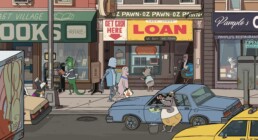'Robot Dreams' Review: When "Best Friends Forever" Has an Ending
Director Pablo Berger's Robot Dreams may be an animated film but its ability to tug at your heartstrings should not be underestimated. After a long awards campaign, which included an Academy Award nomination in 2023 for Best Animated Feature Film, Robot Dreams is finally coming to theaters in Los Angeles on June 6th. Adapted from the graphic novel Robot Dreams by Sara Varo, this beautiful cinematic interpretation is a poignant portrayal of friendship, growing up, and moving on.
From BFFs to Just a Memory
It's another typical day in 1980's New York City. Dog sits down on his couch and unboxes a TV dinner while flippantly surfing through the channels on his TV. Basking in the dim glow from the screen, Dog suddenly feels lonely. He wants–no, needs–a companion in his life. That night, he orders Robot. After a quick assembly on his living room floor, Robot comes to life, and the two misfits immediately become best friends.
There is a newfound pep in Dog's step as he walks the streets of NYC with Robot. This happiness culminates in an epic dance montage where Dog, Robot, and a posse of animal civilians dance to Earth Wind & Fire's "September." The song is reprised as a piano instrumental when the duo takes a trip to the beach, and it evokes the quintessential feeling of summer. The sun is shining, the breeze is blowing, and Dog has never been happier. That is, until Robot realizes that the salty ocean water has rusted his robotic parts in place, rendering him paralyzed. Dog is determined to get his friend off of the beach but the hurdles he faces prove to be anything but smooth sailing.
Things don't fare well for Robot either. Stuck on the beach, he is at the mercy of strangers, some of which are not so kind. Both Dog and Robot are heartbroken at their separation. As time passes, their once-solid friendship inevitably weakens. What was once a beautiful relationship starts to become a distant memory.
A Film Without Dialogue
Music is the driving force behind Robot Dreams, as there is no dialogue throughout the entire film. In addition to being a strong creative choice–that works extremely well–this also allows universal accessibility for audiences. A film without dialogue removes the barrier to entry and allows any age to connect with the material.
On one hand, Robot Dreams is a film for children. The flat-look animation is easy on the eyes with continuous clean lines, flat colors, and limited shadows. On the surface, it is fun, light-hearted fare. On the other hand, it can be argued that only adults can truly absorb the film's emotional subtleties. Robot Dreams is ultimately a meditation on being alone, together, a sentiment that empaths will have a hard time getting through the ending with dry eyes.
Takeaway
Fans of Past Lives and La La Land will feel a similar emotional connection to Robot Dreams. It is a fantasy, a whimsical animated tale, and also a surprisingly emotive story of reflection and friendship.
'Invisible Nation' Review: Taiwan's Battle for Self-Identity
It's fitting that Invisible Nation, a documentary about perseverance, is directed by someone who carries the surname “Hope.” As if intuition led her to make this project, filmmaker Vanessa Hope crafts an empathetic and eye-opening statement that sheds light on Taiwan's struggle for self-identity and acknowledgment. Invisible Nation closely follows Tsai Ing-wen, Taiwan's first female president, as she fights for the future of Taiwan's democracy at a pivotal moment that puts her country's freedom at risk of authoritarianism.
The Political Struggle: ROC vs PRC
"China does not want the world to hear the story of Taiwan," says Tsai Ing-wen as a camera intimately captures the quiet stoicism that covers her face. It's this stark, matter-of-fact sentiment that is the catalyst for Tsai Ing-wen's political motivation to preserve Taiwan's autonomy. For decades, China has considered Taiwan part of the People's Republic of China (PRC) however, Taiwan believes itself to be an independent nation and therefore considers itself the Republic of China (ROC). The film goes deeper into the history of the division by explaining the genesis of the divide and the present-day discourse it elicits within China and Taiwan.
Watch the Invisible Nation trailer here.
At the heart of the film's urgency is the PRC's desire to eventually "unify" Taiwan with China, relinquishing Tsai Ing-wen's control as President and removing the nationality of over 23 million people who call Taiwan home. Throughout interviews with political leaders and notable figures, many project that a major political and geographical upheaval will take place in 2025. Looking at a similar fate in the war between Ukraine and Russia, President Tsai Ing-wen is doing everything in her power to keep what's happening in Ukraine from happening in Taiwan.
Keeping Taiwan in the Headlines
Invisible Nation is equal parts educational and cinematic. The storied history and uncertain future of Taiwan are captivating. Stand-out moments include the erasure that took place on the global stage. As it still stands today, Taiwan is the only member of the International Olympic Committee who is banned from using their name, singing their country's anthem, or flying their country's flag due to the People’s Republic of China's communist rule. Mainland China continues to make concerted efforts to reduce the international personality and exposure of Taiwan, which further hurts Taiwan's global and social status.
Takeaway
President Tsai Ing-wen doesn't shy away from the fact that fighting against the People's Republic of China is an uphill battle, but she knows it's a fight worth engaging in. Invisible Nation is a battle cry and powerful act of defiance that mirrors the threat of democracy everywhere. It's an urgent and necessary viewing for all.
'War and Justice': The Verité Documentary Exposing Global Crimes
Thirteen years in the making, filmmakers Marcus Vetter and Michele Gentile are finally ready to share their new documentary, War and Justice, with the world. Set to screen at the Munich International Film Festival this summer, War and Justice is a politically charged exploration of the International Criminal Court (ICC) and its importance in keeping order in an increasingly disordered world. Billed as the "first and only true-life verité thriller" about this organization, War and Justice offers unparalleled access to the inner workings of the ICC and key players on the inside.
Established in 2002, the International Criminal Court investigates and tries individuals charged with the most horrific crimes impacting the international community. Located in The Hague, Netherlands, the ICC is somewhat of a last resort, only called upon when states belonging to the Nuremberg Legacy fail to act in their own best interest. Similar to the United Nations, the ICC is a non-partisan, humanity-first organization. The crimes the ICC oversees are some of the worst offenses, including genocide, war crimes, crimes against humanity, and crimes of aggression.
War and Justice follows three key people who have helped shape the future of the ICC: Benjamin Ferencz (prosecuting attorney of the Nuremberg Trials), Luis Moreno-Ocampo (ICC’s first prosecutor), and Karim Khan (its current prosecutor). Interviews with other notable figures, including Angelina Jolie and Julian Assange, further illustrate the worldwide support the ICC receives for their valiant work.
The film itself is a very matter-of-fact documentary, there are no bells and whistles. The archival footage of speeches from some of the most violent dictators, including Gadaffi and Putin, is horrific enough. While never exploitive for shock value, there are moments in the film that are hard to absorb. The most unsettling moment comes from Luis Moreno-Ocampo's prosecution of the Congo's unethical practices of recruiting child soldiers for their military. Harrowing footage shows militia stripping naked a young boy, who looks no older than ten, and forcing him into their vehicle. His cries are deafening and his powerlessness is heartbreaking.
War and Justice affirms that the biggest threat to our existence is "aggressive war." While the ICC cannot keep all conflicts from escalating, the documentary shows the institution's invaluable importance in keeping some semblance of worldwide order. Can justice replace war as a mechanism for resolving conflict? This is the question the film sets out to answer. And while there is no quick solution, the positive impact the ICC continues to make is a silver lining in the fight for an equitable and safer world.
'Not Him' Explores the Underbelly of Toxic Relationships
Never ignore a woman's intuition because doing so can result in serious consequences, as seen in filmmaker Sarah Young's short film Not Him. Set in a small New York apartment, a young woman finds herself in an increasingly toxic relationship with her husband and must decide whether or not to stand up for herself. Domestic violence can hide in plain sight and Not Him highlights this all-too-prevalent situation through an empathetic lens.
Michelle (Tori Ernst) has noticed that her husband John (Charlie McElveen) has been acting differently lately. One night, she wakes up in a cold sweat after she has a nightmare that her husband became possessed. However, we soon discover that her night terrors and her reality aren't that different. Michelle is convinced that there is an imposter who body-snatched her once-affectionate and caring husband. The man she sees in front of her now is a volatile and abusive menace who likes to watch Michelle suffer. It isn't until their mutual friends, Kim (Katharine Chin) and Joe (Ryan Nicholas Cooper), come over for an impromptu dinner party that Michelle works up the courage to finally leave him, once and for all.
There is a Jordan Peele similarity to Not Him, be it the uneasy tension or surreal disposition. Writer/director Sarah Young knows how to craft these "pins and needles" moments with finesse. She keeps the audience on their toes right up to the very end. Aiding in the film's suspenseful tone is the strong, surreal music by composer Luke Lotardo. Reminiscent of Philip Glass, there is a familiarity to the sound that grounds Michelle's situation, reminding the audience just how prevalent domestic violence is. The film's third act suffers from the absence of a concrete resolution, the cliffhanger feels more incomplete than an intentional "choose your own adventure" ending. However, as it stands today, Not Him would make a great spec film to aid in a subsequent feature development.
For those who are sensitive to the topic of domestic violence, Not Him can be a triggering watch. Never feeling exploitive or without an empathetic touch, Not Him explores the underbelly of the often secretive trauma that can occur within toxic relationships. Sarah Young stares this difficult topic in the face and the result is an empowering, albeit slightly unfulfilling, story about conviction and self-preservation.
'Gunfighter Paradise' Review: God, Guns, and the American South
Emmy-winning filmmaker Jethro Waters brings his semi-autobiographical dark comedy to life in Gunfighter Paradise, a micro indie film with big ambition. Inspired by his childhood as the son of an Army veteran father and a free-spirited educator mother, Jethro was raised by a very contrarian couple. From this experience, he crafts a tight-knit, experimental film about God, guns, and the American South. Gunfighter Paradise was recently selected into the 2024 RiverRun Film Festival with more screenings taking place this weekend in North Carolina.
Starring Braz Cubas as Stoner, a camouflage-flanked hunter who never removes his face paint, the film begins just as Stoner returns home to North Carolina following the death of his mother. As he settles back into the familiar surroundings of family, he begins to have surreal dissociations, some of which include intense and erotic flashbacks and conversations with God. As he attempts to make sense of the nonsense, Stoner is also forced to deal with another unexpected turn of events: a mysterious green suitcase left to him by his Uncle, containing roughly seven million dollars. Once Stoner discovers that his mother left him hand-written riddles to decipher after her death, he becomes fixated on piecing the clues together. But he doesn't go on this unholy journey alone. Strange visitors, including a cable guy, a mummified cat, and a stone-cold killer threaten to further impact his already fragile state of mind.
Making his narrative feature film debut, Jethro Waters' Gunfighter Paradise is a poetic, trippy passage through the religious South. Baked in a strong visual style set to luscious and poetic descriptions of guns and ammo–something I never thought was possible until now–Gunfighter Paradise is gothic comedy done right. Intentionally dry dialogue delivery and an impressive score feel reminiscent of both Jim Cummings and David Lynch, two filmmakers with extremely specific and highly admirable cinematic canons.
Written, directed, shot, edited, and co-composed by Jethro Waters, Gunfighter Paradise is an equally beautiful and disturbing portrait of spiritual insanity. It offers a unique viewing experience into American psychosis and will no doubt leave a lasting impression on those who resonate with a religious upbringing.
'Billy & Molly: An Otter Love Story' Review: A Tale of Unlikely Friendship
It's a tale as old as time and yet it never fails to strike an emotional chord. National Geographic Documentary Films turns its lens on a special relationship between man and mammal in Billy & Molly: An Otter Love Story. Premiering in the Documentary Spotlight section of the SXSW Film Festival, this heartwarming doc tells the story of a married and childless man, Billy, and the unlikely paternal bond he develops with a motherless young otter, Molly. Be prepared to be awestruck by the beauty of the remote islands of Scotland, which our protagonists call home, as well as astonished by the wonder of the natural world.
Much like the Academy Award-winning documentary My Octopus Teacher, Billy & Molly: An Otter Love Story will leave a lasting impression that I'm convinced has the power to restore faith in humanity. Billy and his wife Susan live a simple life alone by the sea with their sheepdog, Jade. One day, while out on the dock near his house, Billy notices a young, malnourished otter who struggles to crack open a crab. Worried for her well-being and ability to survive on her own while so young, he takes it upon himself to feed the pup and provide her some sense of security. What unfolds in the days, weeks, and months thereafter is a love story that transcends species. With compassion and curiosity, Billy and Molly develop an unlikely relationship that ebbs and flows with joy and heartbreak and ultimately, saves them both.
As to be expected with a National Geographic-distributed film, the visuals are mesmerizing. The arctic waters crashing against the luscious green hills are truly a sight to behold. Drawing comparisons to the rolling landscape depicted in the 2022 stunner The Banshees of Inisherin, the Scottish island that Billy calls home seems to be heaven on earth. Further aiding in the location's angelic quality is the score from Scottish composer Erland Cooper. A beautiful, emotionally persuasive violin score sets the tone of the film and encapsulates the whimsicalness and delicate nature of Billy and Molly's story.
Connecting with nature and those who live in it is the central encouragement at the heart of Billy & Molly: An Otter Love Story. In learning to trust the natural order of things, Billy lets go of the false sense of control he had in his own life. Embracing the role of "surrogate father" for a young otter isn't what Billy imagined when he initially encountered Molly on the dock that day. Little did he know that a year later, he would be building an otter-sized replica house for Molly–whom he has started calling his "wee girl"–fitted with wifi and Polaroid pictures of Billy, his wife, and their dog, hanging on the wallpapered walls.
Directed by Charlie Hamilton James, Billy & Molly: An Otter Love Story is a sincere, uplifting film that offers strong takeaways for both kids and adults alike. Through its strong storytelling arcs and memorable score, Billy and Molly teach us that friendship comes in all shapes, sizes, and species.
This review originally ran on March 9, 2024 during the SXSW Film Festival.
'The Idea of You' Review: Love, Art, and Complicated Relationships
Imagine the lead singer of the hottest British boy band dedicating a love song to you while he's on stage performing for tens of thousands of fans at Coachella. It's pretty much every teen girl's dream and in Michael Showalter's romantic drama The Idea of You, this fairytale is lived out by the most unexpected person: a middle-aged single mom from Silverlake. Part escapist fantasy, part grounded love story that transcends conventional dating taboos, The Idea of You strikes all the right chords in its portrayal of two people living life on their terms.
Anne Hathaway takes command as Solène, an art gallery owner navigating through a complicated relationship with her recently divorced ex-husband, Daniel (Reid Scott), and his much younger girlfriend. Solène and Daniel share custody of their teenage daughter Izzy (Ella Rubin) and she is in the adolescent stage where she'd rather hang out with friends than her parents. Still, Izzy is ecstatic when Solène agrees to accompany her and her friends to Coachella. Making it a point to stay out of her daughter's way, Solène stumbles into the presence of Hayes (Nicholas Galitzine), the lead singer of the UK pop group August Moon. Almost immediately, Hayes is mesmerized by Solène's maturity, confidence, and ignorance of his fame. Solène, on the other hand, meets his flirty advances with politeness but it isn't until Hayes subtly dedicates a love song to her during their set that she unexpectedly begins to form a crush.
What follows is a rush of young love that spans continents, high highs and low lows. Despite their age difference and very different life circumstances, their connection is electric and undeniably authentic. However, Solène can't help but feel out of her element when she is constantly faced with Hayes' youth and mischievous behavior, especially in the form of past girlfriends and hookups. This is the most alive Solène has felt in a long time but still, she questions whether this spark is worth the personal and psychological strain that the relationship is putting on her daughter and, if she's being honest, also herself.
There is a lot to love in this Michael Showalter-directed film, especially the strong casting choices. Anne Hathaway effortlessly slips into the role of Solène, her cool-girl style and graceful aging give off icon status. The only moments I couldn't get behind were the few times she insecurely compares her body to the teenage girls she is surrounded by, because in reality, Hathaway looks better than most supermodels. Nicholas Galitzine, who plays the heartthrob Hayes, nails the Harry Styles vibe. Not only does he give a compelling performance as an infatuated young man who may or may not have mommy issues, but his musical talent is equally impressive. Singing and dancing the way he does, it's no wonder Solène fell under his spell.
Based on the acclaimed novel of the same name by Robinne Lee, The Idea of You is an irresistible story about love, art, and complicated relationships. The film premiered on the Closing Night of SXSW and was nominated for an Audience Award in the Headliner category. The Idea of You comes to Prime Video on May 2nd.
'The Contestant' Review: Tortured For Entertainment On Reality TV
Before The Truman Show became an Oscar-nominated film with undeniable cultural relevance, there was a real-life series that started it all. The year was 1998, and over 15 million people tuned in every week to watch Denpa Shonen: A Life in Prizes. This real-life Japanese reality TV show pushed the boundaries of physical and mental endurance of its single, unwitting participant. In The Contestant, directed by Clair Titley, the unethical practices that went on during this show are exposed in fascinating detail, as well as the ramifications of being tortured for entertainment.
Tomoaki Hamatsu had a difficult childhood. His family was constantly on the move and schoolyard bullies were extremely unkind, specifically pointing out his physical appearance. They called him Nasubi–which translates to "eggplant"–and poked fun at his oblong-shaped head. The name stuck, as soon Tomoaki embraced the name Nasubi, which he still goes by today. Embracing the name was both empowering and comedic, and soon Nasubi realized that comedy was a great deflection to the teasing. He decided to dedicate his life to making people laugh. However, he didn't expect to get recruited to participate in a new reality show that would have people laughing all right... for all the wrong reasons.
Trapped in a tiny apartment, naked and with nothing but stacks of magazines and hundreds of postcards, Denpa Shonen: A Life in Prizes is a human experiment that forces the contestant to survive only on the prizes he wins from magazine sweepstakes. This includes food, clothing, and entertainment. To win the game and end the experiment, the prizes must equal more than one million yen.
Nasubi was the most famous television personality in Japan without even knowing it.
A Life in Prizes coverage consisted of 24 hours of filming, 7 days a week, with two cameras, and eventually, a round-the-clock live stream was available online. Nasubi, who understandably started to lose his grip on reality from isolation and starvation, was in a constant struggle between sanity and madness. If he didn't win a sweepstake prize that day, he would go to bed hungry. On occasion, producers had to sneak into his room in the middle of the night to give him crackers so he wouldn't die from malnutrition. Audiences were obsessed with Nasubi's journey and cheered him on from the sidelines, but Nasubi had no idea he was gaining any notoriety. In fact, he didn't know he was being broadcast at all. Nasubi was the most famous television personality in Japan without even knowing it.
Through exclusive interviews with Nasubi and people close to the show, The Contestant exposes so many cracks in its foundation. For starters, Nasubi never signed a contract. The show's producer, Toshio Tsuchiya, initially persuaded Nasubi to strip naked by claiming that most of what he did wouldn't be aired. This overt manipulation tactic lowered Nasubi's initial hesitation, therefore making it easier for Toshio to control Nasubi. While not literally locked inside the apartment, Nasubi was gullible enough to go along with the inhumane antics until he won. He recounts this experience with a sense of quiet pride, despite the harsh conditions and unethical treatment, Nasubi came out on top. When all was said and done, he spent 1 year and 3 months competing in A Life in Prizes.
Nowadays, it's not uncommon to look back on various forms of entertainment of the past and see how poorly it has aged with time. Britney Spears talks about it in her memoir, specifically how cruel the press and industry were to her as she was coming of age in the spotlight. Denpa Shonen: A Life in Prizes is another one of those moments in the cultural zeitgeist that would not exist if it were pitched today, based on the sheer torment and manipulation that Nasubi was put through. The Contestant reveals, in stunning detail, how Nasubi not only survived fame and famine, but everything in between.








